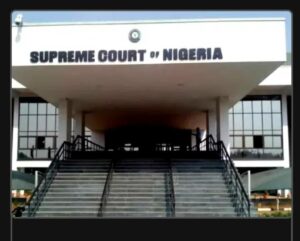November 15, 2024
By Idris Buba
The Supreme Court, has declined to declare the operations of the Economic and Financial Crimes Commission, EFCC, and two other anti-corruption agencies that were created by the Federal Government illegal.
The other agencies are the Independent Corrupt Practices and other related offences Commission, ICPC and the Nigerian Financial Intelligence Unit, NFIU
In a unanimous decision on Friday , a seven-man panel of the apex court, led by Uwani Abba-Aji, dismissed the suit filed Kogi and 18 other states to query the legal validity of the process that led to the establishment of the anti-graft agency in 2002.
According to the court, the EFCC Establishment Act did not require any form of ratification by the Houses of Assembly of the 36 states of the federation since it was not a treaty but a convention.
“A convention would have been ratified by member states, and the National Assembly can make laws from it, which will be binding on all the states in Nigeria as it is in the case of EFCC Establishment Act.
“In a country like Nigeria, the federating units do not have absolute power. The NFIU guideline is to present a benchmark and not to control the funds.
“Where an act of law is made by NASS like the NFIU and its guidelines, it is binding on all. Any act that has been competently enacted by the NASS cannot be said to be inconsistent.
“Where the NASS has enacted several laws on corruption, money laundering, etc., no state has the right to make law to compete with them. The investigative power of the EFCC cannot be said to be in conflict with legislative powers of the state assembly.
READ MORE; Femi Falana, declares stance on EFCC
“I must agree with the AGF that the plaintiffs’ argument, that is, the Houses of Assembly of the plaintiffs’ states, is not tenable in law,” the Supreme Court added.
EFCC was established by an Act of the National Assembly on December 12, 2002, by the then administration of former President Olusegun Obasanjo.
The Commission commenced its operational activities on April 13, 2003, though its Establishment Act was later amended in 2004.
The states, through their respective Attorneys General, had argued that Section 12 of the 1999 Constitution, as amended, was not complied with before the EFCC began its operations.
They argued that it was a mandatory provision of the Constitution that the majority of the Houses of Assembly of States must vote and agree to the passage of the EFCC Act, not something only the National Assembly was legally allowed to do.
READ MORE; EFCC, Unconstitutionally Established …Olisa Agbakoba
The plaintiffs maintained that since due process was not followed before the EFCC Establishment Act was enacted, it cannot be applicable in states that never approved of it, in accordance with provisions of the 1999 Constitution, as amended.
They argued that any agency that was formed as a result of the Act ought to be regarded as an illegal institution.
The states relied on the fact that since the 1999 Constitution, as amended, is the supreme law of the land, any Act of the National Assembly that is inconsistent with the constitution ought to be declared a nullity.
Even though the suit, marked: SC/CV/178/2023, was originally brought before the court by Kogi State, however, some states applied and were joined as co-plaintiffs while others filed applications for their own suit to be consolidated with the matter.
Attorney-General of the Federation and Minister of Justice, Prince Lateef Fagbemi, SAN, who represented the FG, challenged the competence of the legal action, which it described as a threat to the ongoing fight against corruption and financial crimes in the country.
The AGF maintained that contrary to the contention of the states, the EFCC was validly established in line with the provision of Section 15(5) of the 1999 Constitution, as amended.
More details later.




